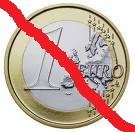Democrat November-December 1998 (Number 33)
Global crisis knocks EURO

Arguments used to justify the government's decision
to make the Bank of England "independent" are looking increasingly
threadbare as Chancellor Gordon Brown dropped enormous hints that
interests rates should be lowered and Tony Blair wrung his hands over
the state of the economy blaming "global conditions."
Making the Old Lady of Threadneedle Street "independent"
and giving the power to set interest rates to the bank's monetary
committee by the Labour government immediately after the election
was, of course, a precursor to handing over economic power to the
European Central Bank - ECB - in Frankfurt.
Mr Blair told us that this "independence" was necessary
to take the running of the economy "out of the political arena" in
line with his obsessive adherence to the quasi-religious globalist
economic philosophy which says the unregulated free market was a rational
way of running the world. However, the sight of Blair pitying Fujitsu
workers in Newcastle who had just lost their jobs because of the strength
of the pound making exports more and more difficult to sell should
be enough to suggest that something is seriously wrong.
Fickle free market
The fickleness of believers in "free market" fundamentalism
was cruelly exposed when Japan broke ranks and pumped a staggering
300 billion of public money into the country's failing financial sector,
temporarily nationalising its largest banks in a spending spree that
has been coined "socialism for bankers". Also an increasingly desperate
United States Federal Reserve cut interest rates in as many months
in what was clearly a political decision to boost the economy and
kick start much needed growth.
The actions of Tokyo and Washington followed predictions
by the World Trade Organisation, in a sharp revision downwards of
its previous estimate, that growth in world trade would more than
halve this year and slump further next year as a result of Asia's
crisis. The WTO's chief economist, Patrick Low, said the growth in
world trade was forecast to halve to four percent in 1998, revised
down from a previous estimate for seven percent, from 1997's 9.5 percent,
and to around three percent in 1999.
The forecast for a downward spiral in world trade
growth was in sharp contrast to its prediction in March that Asia's
crisis would cause just "a small dent" in the world economy. Despite
this the heads of the ECB and Germany's Bundesbank, Wim Duisenberg
and Hans Tietmeyer, have dismissed global recession fears and maintain
that "core" European nations should refrain from interest rate cuts
to help global growth.
Controls called for
However, Oskar Lafontaine, the German Social Democrat
party leader nominated to become finance minister in the new government,
called for more political control over EU economic policy, calling
for something called a "European economic government" to co-ordinate
budget, tax and social policies in the coming euro superstate.
Ultimately, however much these thieves fall out they
all agree that democratic control of economic policies within the
nation states of Europe is the main enemy.